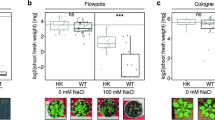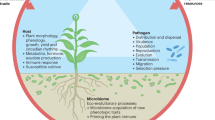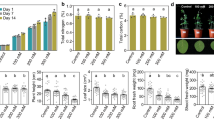Abstract
Rovira and Bowen1 reported reduction in root elongation and in root-hair development following the addition of pasture soil suspension to seedlings of clover, tomato, Phalaris tuberosa and Pinus radiata raised in sterile agar or sand culture. They suggested the possibility of a complex interaction between plants and micro-organisms. Since there was no observable effect on the plant tops in their experiments, the reduced absorbing surface of the roots was apparently offset by the ‘luxury’ amounts of plant nutrients used.
This is a preview of subscription content, access via your institution
Access options
Subscribe to this journal
Receive 51 print issues and online access
$199.00 per year
only $3.90 per issue
Buy this article
- Purchase on Springer Link
- Instant access to full article PDF
Prices may be subject to local taxes which are calculated during checkout
Similar content being viewed by others
References
Rovira, A. D., and Bowen, G. D., Nature, 185, 260 (1960).
Newhook, F. J., N.Z. J. Agric. Res., 2, 808 (1959).
Sutherland, C. F., Newhook, F. J., and Levy, J., N.Z. J. Agric. Res., 2, 844 (1959).
Kerr, A., Austral. J. Biol. Sci., 9, 45 (1956).
Author information
Authors and Affiliations
Rights and permissions
About this article
Cite this article
NEWHOOK, F. Non-Lethal Pathological Infection of Roots. Nature 191, 615–616 (1961). https://doi.org/10.1038/191615a0
Issue Date:
DOI: https://doi.org/10.1038/191615a0
Comments
By submitting a comment you agree to abide by our Terms and Community Guidelines. If you find something abusive or that does not comply with our terms or guidelines please flag it as inappropriate.



